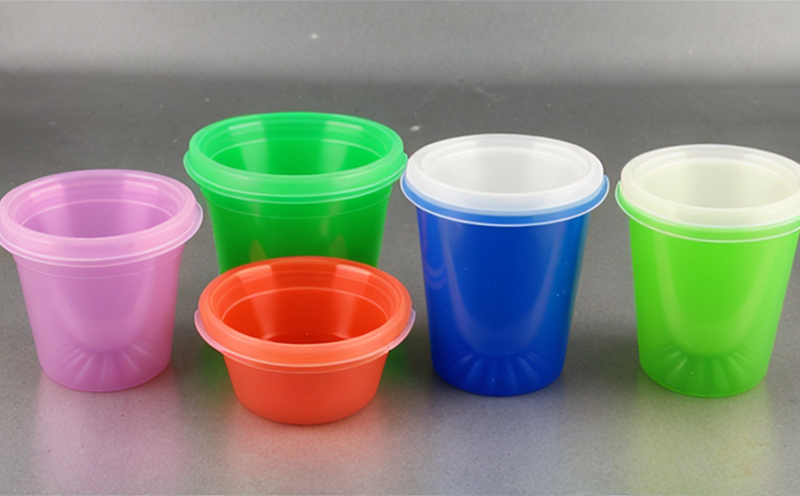NF T54-122 Disposable Plastic Containers Flexural Testing
The NF T54-122 standard is a recognized French normative document that provides detailed specifications for flexural testing of disposable plastic containers. This testing method is essential for ensuring the structural integrity and safety of products used in various sectors, including healthcare, food packaging, and consumer goods.
Flexural testing measures how much stress a material can withstand before it deforms or breaks. In the context of disposable plastics, this test helps manufacturers identify potential weaknesses that could lead to product failure under normal use conditions. The flexibility and durability of these containers are critical for ensuring they perform reliably in their intended applications.
The NF T54-122 method uses a three-point bend test setup where the specimen is clamped at two points, and a force is applied to the middle section until deformation or fracture occurs. This type of testing allows for precise measurement of flexural properties such as flexural strength (σ) and modulus of elasticity (E).
Understanding these properties is crucial for optimizing product design and ensuring compliance with regulatory standards. For instance, in healthcare applications, improper flexibility could result in breakage during sterilization or handling, while insufficient rigidity might compromise the container's ability to protect its contents.
The testing process begins with careful preparation of the specimens according to NF T54-122 guidelines. Specimens are typically cut from larger sheets of plastic material and must be free from defects that could affect test results. Once prepared, they are placed into the flexural testing machine where the force application is controlled and recorded.
After conducting multiple tests on different batches or versions of the product, data analysis helps determine whether the materials meet required performance criteria. Compliance with NF T54-122 ensures that manufacturers can trust their processes while also meeting stringent industry standards.
In summary, NF T54-122 flexural testing plays a vital role in maintaining quality control throughout production cycles and ensuring product reliability across various markets.
Scope and Methodology
| Test Type | Flexural Testing |
|---|---|
| Applicable Standards | NF T54-122 |
| Materials Tested | Disposable plastic containers |
| Objective | Evaluate flexural strength and modulus of elasticity |
| Test Setup | Three-point bend test |
The flexural testing process involves subjecting the specimen to a predetermined load until it reaches its maximum deflection or fails. This method allows for accurate measurement of key mechanical properties, providing valuable insights into material performance.
Before initiating tests, specimens must be prepared according to NF T54-122 specifications. This includes ensuring uniform thickness across all samples and removing any imperfections that could influence test outcomes.
During the actual testing phase, a controlled force is applied gradually until failure occurs or specified displacement limits are reached. Data collected during this period includes load values at various stages of deflection as well as final breaking loads if applicable.
Post-test analysis involves evaluating all recorded data points against predefined acceptance criteria outlined in NF T54-122. Compliance with these standards ensures consistent quality across production batches and supports overall compliance efforts.
Benefits
- Enhanced product reliability through rigorous evaluation of flexural strength
- Improved customer satisfaction by ensuring safe, durable packaging solutions
- Increased competitive advantage via superior material selection and optimization
- Prompt identification of potential design flaws leading to improved future iterations
- Facilitation of regulatory compliance with relevant international standards like NF T54-122
- Support for continuous improvement initiatives within R&D departments
- Streamlined quality assurance processes through automated data collection and analysis
- Promotion of sustainable practices by selecting environmentally friendly materials that meet stringent performance requirements
Implementing NF T54-122 flexural testing offers numerous advantages for businesses operating in the disposable plastics industry. By adhering to this standard, companies can enhance their reputation as leaders in innovation and excellence while also ensuring long-term success.





